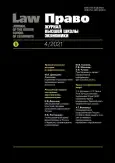Crimes in the Sphere of Computer Information: Critical Look
- Autores: Gracheva Y.1, Malikov S.1, Chuchaev A.2
-
Afiliações:
- Kutafin Moscow State Law University
- Institute of State and Law of the Russian Academy of Sciences
- Edição: Volume 14, Nº 4 (2021)
- Páginas: 152-176
- Seção: Russian Law: Condition, Perspectives, Commentaries
- URL: https://journal-vniispk.ru/2072-8166/article/view/318130
- DOI: https://doi.org/10.17323/2072-8166.2021.4.152.176
- ID: 318130
Citar
Texto integral
Resumo
Sobre autores
Yulia Gracheva
Kutafin Moscow State Law University
Email: uvgracheva@mail.ru
ORCID ID: 0000-0002-3341-7422
Doctor of Sciences (Law), Professor
Sergey Malikov
Kutafin Moscow State Law University
Email: s.v.malikov@yandex.ru
ORCID ID: 0000-0003-0892-2328
Doctor of Sciences (Law), Professor
Alexander Chuchaev
Institute of State and Law of the Russian Academy of Sciences
Email: noreply@hse.ru
ORCID ID: 0000-0002-5144-052X
Doctor of Sciences (Law), Professor
Bibliografia
- Aryamov A.A. et al. (2019) Deviations in the digital world: criminal and legal dimension. Part I. Moscow: Kontrakt, 160 p. (In Russ.).
- Borcheva N.A. (2004) Computer crimes in Russia: Commentary to the Russian Criminal Code. Moscow: Prima Press, 22 p. (In Russ.).
- Buchanan R. (2019) Cyberspionage and international law. Oxford: Hart, 219 p.
- Bykov V.M., Cherkasov V.N. (2012) New law on computer crimes: Art. 272 of the Criminal Code. Rossijskij sud'ya = Russian Judge, no. 5, pp. 14-19. (In Russ.).
- Criminal law of Russia (2018) A.I. Rarog (ed.). Moscow: Prospekt, 624 p. (In Russ.).
- Efremova M.A. (2012) Liabiibility for illegal access to computer information. Vestnik Kazanskogo yuridicheskogo instituta = Herald of Kazan Jaw Institute, no. 8, pp. 54-56. (In Russ.).
- Eun Y.-S., Aßmann J. S. (2016) Cyberwar: Summing up security and war in the digital age. Prospects for International Studies, vol. 17, no. 3, pp. 343-360.
- Gladkikh V.I. (2014) Computer fraud: and were there any grounds for criminalizing it? Rossijski sledovatel-Russian Investigator, no. 22, pp. 25-31. (In Russ.).
- Gromov E.V. (2006) Development of criminal legislation on crimes in the field of computer information in foreign countries (USA, Great Britain, Germany, the Netherlands, Poland). Vestnik TGPU-Herald of Tyumen Politechnical University, no. 11, pp. 30-35. (In Russ.).
- Khaliullin A. I. (2015) Illegal copying as a consequence of a crime in the field of computer information. Rossijskij sledovatel'-Russian Investigator, no. 8, pp. 23-26. (In Russ.).
- Khilyuta V.V. (2014) The liability for theft with using computer technology. Zhurnal rossijskogo prava=Journal of Russian Law, no. 3, pp. 111-118. (In Russ.).
- Meshkov V.M. (2003) Computer crimes and protection of computer information. Kaliningrad: MVD Institute, 119 p. (In Russ.).
- Omarov M.D. (2011) Composition of illegal access for information systems resources. Yuridicheskiy vestnik DGU - Law Herald of Far East University, no. 4, pp. 56-58. (In Russ.).
- Panfilova E.I. (2003) The computer crimes. Saint Petersburg: Prosecutor General research institute, 47 p. (In Russ.).
- Stoddart K. (2016) Cybersecurity of Great Britain and protection of critical national infrastructure. International Affairs, vol. 92, no. 5, pp. 1079-1105.
- The quality of the criminal law: special part (2017) A.I. Rarog (ed.). Moscow: Prospekt, 381 p. (In Russ.).
- Tretyak M. I. (2016) Modification of computer information and its correlation with other methods of computer fraud. Ugolovnoe pravo-Criminal Law, no. 2, pp. 95-101. (In Russ.).
- Tropina T.L. (2005) Cybercrime: concept, state, legal struggle. Candidate of Juridical Sciences Thesis. Vladivostok, 235 p. (In Russ.).
- Yuzhin A.A. (2014) Debatable issues of fraud in the field of computer information. Pravo i kiberbezopasnost'-Law and Cybersecurity, no. 2, pp. 15-18. (In Russ.).
Arquivos suplementares








